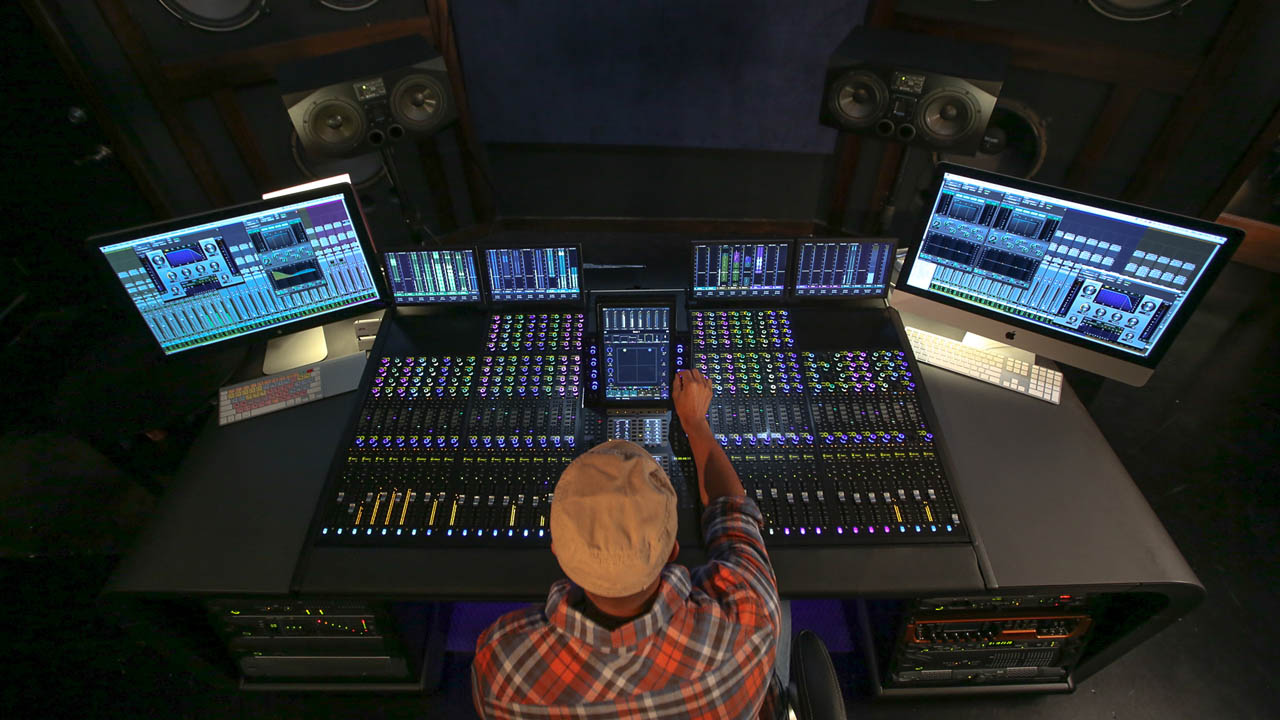Home>Production & Technology>Musician>What Side Jobs Are Great For Me As A Musician


Musician
What Side Jobs Are Great For Me As A Musician
Modified: February 1, 2024
Discover side jobs perfect for musicians and boost your income. Explore opportunities that fit your skills and passion as a musician.
(Many of the links in this article redirect to a specific reviewed product. Your purchase of these products through affiliate links helps to generate commission for AudioLover.com, at no extra cost. Learn more)
Table of Contents
- Introduction
- Benefits of Having Side Jobs as a Musician
- Factors to Consider Before Choosing a Side Job
- Side Jobs Suitable for Musicians
- Teaching Music Lessons
- Performing at Events and Functions
- Music Production and Arrangement
- Session Musician
- Music Blogging and Writing
- Selling Music Merchandise
- Composing and Licensing Music
- Sound Engineering and Mixing
- Music Therapy
- Songwriting and Jingle Creation
- Conclusion
Introduction
Being a musician is a passion and a dream for many individuals. Whether you play an instrument, sing, or produce music, the joy of creating and performing is undeniable. However, it can sometimes be challenging to make a steady income solely from music, especially in the early stages of your career.
That’s where side jobs come in. Engaging in side jobs as a musician not only provides a supplemental income, but it also offers various other benefits. In this article, we will explore the advantages of having side jobs as a musician and discuss different options that are well-suited for musicians. So, let’s dive in!
One of the key benefits of having side jobs as a musician is the financial stability it provides. While pursuing your passion for music, it’s essential to have a reliable income stream to cover your expenses, invest in equipment, and fund your musical projects. Side jobs can help you achieve that stability, allowing you to focus on your music without constantly worrying about money.
Another advantage of side jobs is the opportunity to expand your skills and network. Working in different industries or roles can expose you to new experiences, knowledge, and connections. These experiences can potentially open doors to collaborations, introductions to industry professionals, and new creative opportunities.
Moreover, side jobs can enhance your versatility as a musician. Engaging in various activities outside of your primary musical pursuit can help you develop new skills, such as teaching, production, or writing, that complement your musical abilities. This versatility not only makes you more marketable but also enables you to explore different facets of the music industry.
Before choosing a side job, it’s important to consider a few factors. Firstly, think about your schedule and the time commitment required for the side job. Make sure it’s something you can manage alongside your musical career to avoid burnout or compromising your artistic endeavors. Additionally, consider the compatibility of the side job with your musical goals and values. Look for opportunities that align with your interests and can contribute to your growth as a musician.
Now that we’ve explored the benefits and factors to consider, let’s delve into some side job options that are particularly suitable for musicians. These opportunities not only provide a source of income but also allow you to utilize and showcase your musical talents and expertise.
Benefits of Having Side Jobs as a Musician
Having side jobs as a musician offers numerous advantages that go beyond financial benefits. Let’s take a closer look at some of the key benefits:
1. Financial Stability: The music industry can be unpredictable, especially for emerging artists. Having side jobs provides a steady income stream, ensuring you have financial stability while pursuing your musical aspirations. It allows you to cover your expenses, invest in professional equipment, and fund your creative projects without constantly worrying about making ends meet.
2. Skill Development: Engaging in side jobs outside of music can help you develop new skills that complement your musical talents. Whether it’s teaching music, writing songs for commercials, or producing music for other artists, these activities expand your knowledge and proficiency in different areas of the industry. This versatility not only makes you more marketable but also enhances your overall musicianship.
3. Network Expansion: Side jobs provide opportunities to meet new people and expand your professional network. Whether you’re performing at events, teaching music lessons, or working in a music-related role, you come across individuals from various backgrounds who may introduce you to new opportunities or collaborate with you on future projects. Building a strong network is crucial for success in the music industry, and side jobs can facilitate that.
4. Creative Inspiration: Many side jobs involve working with other musicians, artists, or creative professionals. Collaborating with like-minded individuals can spark new ideas and inspire your own musical journey. The experiences gained from these interactions can help you break free from creative blocks and explore new genres or styles of music.
5. Diversification of Income: Relying solely on income from music can be risky, as it may fluctuate or be affected by external factors. Having side jobs diversifies your income sources, reducing financial vulnerability. In times of uncertainty, you have alternative sources of income to rely on, allowing you to continue pursuing your music career even during challenging periods.
6. Personal Growth: Side jobs can contribute to your personal growth outside of music. Teaching music classes, for example, not only benefits the students but also enhances your communication and leadership skills. Similarly, working in music production or writing exposes you to different aspects of the industry, expanding your knowledge and understanding of the music business as a whole.
7. Exposure and Visibility: Some side jobs, such as performing at events or writing music for commercial projects, can provide valuable exposure and visibility. These opportunities allow you to showcase your talent to a broader audience, potentially attracting new fans and industry professionals who can further enhance your music career.
In summary, having side jobs as a musician offers financial stability, skill development, network expansion, creative inspiration, income diversification, personal growth, and exposure. These benefits not only provide practical advantages but also contribute to your overall growth and success in the music industry. Now that we’ve explored the benefits, let’s move on to some side job options that are particularly suitable for musicians.
Factors to Consider Before Choosing a Side Job
While having a side job as a musician can bring numerous benefits, it’s essential to consider a few factors before making a decision. Here are some key factors to keep in mind:
1. Time Commitment: Evaluate the time commitment required for the side job and consider whether it aligns with your availability and other musical commitments. Ensure that the side job allows you enough time and flexibility to focus on your music career and artistic pursuits without feeling overwhelmed or burnt out.
2. Compatibility with Musical Goals: Consider how the side job aligns with your musical goals and aspirations. Review whether it complements your skills, interests, and values. Look for opportunities that offer experiences and connections that could contribute to your growth as a musician. Choosing a side job that aligns with your musical journey can make the experience more fulfilling and beneficial in the long run.
3. Financial Considerations: Assess the financial aspects of the side job, including the expected income and whether it meets your financial needs. Evaluate whether the monetary benefits are worth the time and effort invested in the side job. Remember that the primary goal of a side job is to provide financial stability, so it’s crucial to choose an opportunity that offers a fair compensation package.
4. Skills Development: Reflect on what skills you want to develop alongside your musical abilities. Determine whether the side job offers opportunities to enhance your existing skills or develop new ones that align with your long-term musical aspirations. Choose a side job that allows you to cultivate talents that will contribute to your overall growth as a musician.
5. Work-Life Balance: Maintain a healthy work-life balance by considering the impact of the side job on your personal life. Evaluate whether the side job allows you to have time for rest, self-care, and quality time with loved ones. Striking a balance between work and personal life is crucial to prevent burnout and ensure overall well-being.
6. Passion and Enjoyment: While financial stability is crucial, it’s also important to find a side job that brings you joy and fulfillment. Choose a side job that you are passionate about and enjoy doing. This will not only make it easier to invest time and effort into it but also create a more positive and rewarding experience that contributes positively to your overall well-being.
7. Long-Term Viability: Consider the long-term viability of the side job. Evaluate the industry’s growth potential, the demand for the specific skill set required, and the stability of the job market. It’s essential to choose a side job that offers long-term opportunities for growth and sustainability.
By considering these factors, you can make an informed decision when choosing a side job as a musician. Remember to prioritize your musical goals and aspirations while also ensuring financial stability and personal fulfillment. Now, let’s explore some side job options that are well-suited for musicians.
Side Jobs Suitable for Musicians
As a musician, there are various side job options that are well-suited for your talents and interests. These opportunities not only provide a supplemental income but also allow you to put your musical abilities to use. Here are some side jobs that are particularly suitable for musicians:
- Teaching Music Lessons: Share your knowledge and expertise by offering music lessons. Whether it’s teaching an instrument, vocals, or music theory, you can provide one-on-one or group lessons to aspiring musicians. Teaching not only allows you to earn income but also helps you strengthen your own skills and communication abilities.
- Performing at Events and Functions: Utilize your talent by performing at events, weddings, parties, and corporate functions. Whether you play solo or as part of a band, these gigs provide an opportunity to showcase your skills, entertain audiences, and earn a good income based on your performance duration and level of experience.
- Music Production and Arrangement: If you have skills in music production, recording, and arranging, consider offering your services to other musicians or bands. This can involve producing, mixing, and mastering tracks, as well as providing creative input in arranging and shaping musical compositions according to clients’ needs.
- Session Musician: If you excel at playing a specific instrument, you can work as a session musician for recording studios or live performances. As a session musician, you collaborate with different artists and contribute your musical expertise to enhance their projects or live shows.
- Music Blogging and Writing: If writing is your forte, consider starting a music blog or contributing articles to existing music publications. You can share your insights, review albums, interview musicians, and provide valuable content to music enthusiasts. This can also open doors to partnerships and collaborations within the music industry.
- Selling Music Merchandise: Create and sell merchandise related to your music, such as t-shirts, hats, posters, or accessories. You can set up an online store or sell your merchandise at live events and concerts. This not only generates additional income but also helps promote your brand and connect with fans.
- Composing and Licensing Music: Use your skills in composition and music production to create original music for commercials, films, TV shows, or video games. You can also license your existing tracks to production companies or independent filmmakers, earning royalties whenever your music is used.
- Sound Engineering and Mixing: If you have expertise in sound engineering and mixing, consider offering your services for live gigs, studio recordings, or post-production. Your skills in optimizing sound quality and balancing various instruments and vocals are highly valuable in the music industry.
- Music Therapy: Combine your love for music and helping others by becoming a music therapist. As a music therapist, you can work with individuals facing physical, emotional, or cognitive challenges, using music to facilitate healing, encourage self-expression, and improve overall well-being.
- Songwriting and Jingle Creation: If you have a knack for writing catchy melodies and lyrics, offer your songwriting services to other artists or companies in need of jingles. Compose original songs or jingles that align with their brand and messaging, providing a unique musical touch.
These are just a few examples of the side job options available for musicians. The key is to find a side job that aligns with your skills, interests, and long-term goals as a musician. By exploring these opportunities, you can not only earn a supplemental income but also continue to nurture your passion for music while expanding your professional horizons.
Now that we’ve discussed several side job options, let’s wrap up this article.
Teaching Music Lessons
Teaching music lessons is an excellent side job option for musicians who want to share their knowledge and passion for music with others. Whether you are proficient in playing an instrument, singing, or have a strong foundation in music theory, teaching music lessons allows you to utilize your skills while earning a supplemental income.
One of the advantages of teaching music lessons is the flexibility it offers. You can choose to teach one-on-one lessons or group lessons, depending on your preferences and availability. This flexibility allows you to tailor your teaching approach to suit the needs and learning styles of your students.
Teaching music lessons not only benefits your students but also enhances your own musicianship. Explaining complex musical concepts and techniques to your students helps solidify your understanding of the subject matter. Teaching forces you to think critically about your own playing or singing and encourages you to continuously improve your skills.
Additionally, teaching music lessons allows you to develop valuable communication and interpersonal skills. As a music teacher, you will interact with students of different ages and skill levels. This experience hones your ability to effectively communicate musical concepts and adapt your teaching style to meet the individual needs of each student.
The income potential of teaching music lessons can vary depending on factors such as your location, experience, and the number of students you have. You can choose to teach in-person lessons at your home, a music school, or travel to your students’ homes. Alternatively, you can also offer online lessons, which allows you to reach a wider range of students and expand your teaching opportunities beyond geographical limitations.
Apart from the financial benefits, teaching music lessons is also a rewarding experience. Witnessing your students’ progress, seeing their passion for music grow, and knowing that you have played a role in their development as musicians can be incredibly fulfilling.
To get started with teaching music lessons, you will need to determine your target audience and the instruments or subjects you will teach. Promote your services through word-of-mouth, social media, or by creating a website to showcase your expertise and attract potential students. It’s also helpful to set clear policies and expectations regarding lesson schedules, fees, and practice requirements to ensure a smooth teaching experience.
Overall, teaching music lessons is a fulfilling side job option for musicians. It allows you to share your love for music, enhance your own skills, and make a positive impact on the musical journeys of your students. Consider exploring teaching music lessons as a way to expand your musical influence and generate income while pursuing your passion.
Performing at Events and Functions
Performing at events and functions is an exciting and rewarding side job option for musicians. Whether you are a solo artist, a band member, or part of a musical ensemble, showcasing your talent at weddings, parties, corporate events, and other special occasions allows you to entertain audiences while earning a supplemental income.
One of the main advantages of performing at events is the opportunity to showcase your skills and gain exposure. These gigs provide a platform for you to perform in front of diverse audiences and potentially attract new fans or connections within the music industry. The exposure gained from these performances can lead to further opportunities, such as collaborations with other artists or invitations to perform at larger and more prestigious events.
The income potential of event performances can vary depending on factors such as the duration of the performance, the type of event, and your level of experience. Negotiating fair compensation for your services is important, considering factors such as travel expenses, equipment requirements, and the time invested in rehearsals and preparations for the event.
Performing at events also allows you to expand your repertoire and versatility as a musician. Depending on the nature of the event, you may need to tailor your performance to suit different musical genres or styles. This flexibility challenges you to adapt to different environments and audiences, ultimately strengthening your ability to engage and entertain a wide range of listeners.
When pursuing event performances, networking becomes a crucial aspect of your job. Building relationships with event planners, wedding coordinators, and other professionals in the event industry can lead to consistent gigs and referrals. Attend industry events, showcase your talent, and distribute promotional materials to generate interest in your services.
It’s important to be prepared and professional when performing at events. Arrive early to set up your equipment and ensure that everything is in working order. Be adaptable and open to last-minute changes or requests from event organizers. Interacting with the audience and creating a positive and engaging atmosphere are key elements to ensure a memorable experience for both the guests and the event hosts.
Aside from the financial benefits, performing at events is a rewarding experience. It allows you to share your passion for music and create memorable moments for people on special occasions. The joy and positive energy you bring to an event can leave a lasting impression on the attendees and contribute to the overall success of the gathering.
To get started with event performances, create a promotional package that includes demo recordings, videos, testimonials, and a professional biography. This package will help you present yourself to potential clients and convey your expertise and professionalism. Additionally, consider creating an online presence through a website or social media platforms to showcase your previous performances and connect with potential clients.
Performing at events and functions offers musicians the opportunity to earn income, gain exposure, expand their repertoire, and create memorable experiences. If you enjoy performing live and thrive in different settings, consider exploring this side job option to enhance your musical career.
Music Production and Arrangement
For musicians with a keen interest in the technical aspects of music creation, offering music production and arrangement services can be a highly rewarding side job option. Music production involves overseeing and guiding the entire process of recording, mixing, and mastering music, while arrangement focuses on shaping and organizing musical elements to create a compelling piece.
One of the benefits of offering music production and arrangement services is the ability to bring other artists’ musical visions to life. Collaborating with singers, bands, or songwriters, you can use your skills to transform their raw ideas into polished and professional-sounding tracks. This process often involves recording instruments, arranging vocal harmonies, refining song structures, and mixing and mastering the final product.
As a music producer, you are responsible for creating an optimal sound environment, balancing the mix, and ensuring that the recording captures the essence of the artist’s performance. Your ability to achieve a high-quality sound and create a cohesive and captivating musical arrangement is essential to enhancing the overall impact and appeal of a song or album.
Offering music production and arrangement services also allows you to expand your technical expertise in areas such as recording techniques, audio editing, MIDI programming, and music software. This continuous learning process helps you stay up to date with industry trends and advances in music production technology, enhancing your value as a producer.
The income potential in music production and arrangement can vary based on factors such as your experience, reputation, and the scale of projects you undertake. Collaboration with established artists, record labels, or advertising agencies may lead to higher-paying opportunities. Building a solid portfolio of successful projects can help attract new clients and increase your earning potential.
Marketing your services as a music producer and arranger is crucial for success in this field. Creating a professional website or portfolio showcasing your previous work, skills, and testimonials can help attract potential clients. Networking and collaborating with other musicians, industry professionals, and music platforms can also open doors to new opportunities and expand your client base.
When working as a music producer or arranger, effective communication and collaboration are key. Understanding the artist’s vision, providing constructive feedback, and maintaining a positive working relationship are essential elements in delivering a successful end product. It is important to balance your creative input with respecting the artist’s artistic direction.
Overall, offering music production and arrangement services as a side job allows you to utilize your technical and creative skills to bring music to life. It provides opportunities for collaboration, skill development, and earning income while contributing to the artistic journeys of other musicians. If you have a passion for music production and arrangement, consider exploring this side job option as a way to enhance your career and expand your musical horizons.
Session Musician
If you have exceptional instrumental skills and a knack for adapting to various musical styles, working as a session musician can be a rewarding and flexible side job option. As a session musician, you collaborate with different artists and bands, lending your expertise to their recordings or live performances.
One of the key benefits of being a session musician is the opportunity to work with a diverse range of musicians and genres. Your ability to quickly learn and adapt to different musical styles and contribute creatively to the project is highly valued. This experience allows you to expand your musical horizons, strengthen your versatility, and grow as a musician.
Working as a session musician also offers networking opportunities. Collaborating with different artists, producers, and music industry professionals can lead to new connections and potential future collaborations. Building a strong network within the music industry is crucial for career growth and opens doors to additional opportunities.
The income potential of being a session musician varies based on factors such as your level of experience, reputation, and the scale of the projects you undertake. You may be hired for studio recording sessions or live performances, both of which can provide a steady income source. Securing recurring gigs or becoming a highly sought-after session musician can lead to higher-paying opportunities.
To establish yourself as a session musician, it is important to develop a strong musical foundation and strive for excellence in your instrument. Building a well-rounded skill set and demonstrating your ability to adapt to different musical contexts will make you a valuable asset in the industry.
Marketing yourself as a session musician is key to finding opportunities. Create a professional portfolio showcasing your skills, experiences, and recordings. Utilize social media platforms and music industry networks to promote your services and connect with potential clients and collaborators. Building relationships with local bands, music producers, and studios can also lead to regular session work.
When working as a session musician, professionalism and adaptability are essential. Be punctual, well-prepared, and open to feedback. Respect the artist’s vision, while also offering your creative input when appropriate. A positive attitude and a willingness to collaborate will contribute to a successful and harmonious working relationship.
In summary, working as a session musician allows you to utilize your instrumental skills, gain exposure to various musical styles, expand your network, and earn income. The ability to adapt and contribute creatively to different projects is highly valued, making this an exciting and fulfilling side job option for talented musicians.
Music Blogging and Writing
For musicians with a passion for writing and a desire to share their insights and knowledge about music, music blogging and writing can be an engaging and fulfilling side job. It allows you to combine your love for music with your writing skills, creating content that educates, entertains, and engages music enthusiasts.
One of the benefits of music blogging and writing is the opportunity to establish yourself as an authority in the music industry. By providing valuable content, such as album reviews, artist profiles, music industry news, and educational articles, you can build a loyal readership and gain recognition for your expertise.
Music blogging and writing also offer the flexibility to express your creativity and explore different topics within the music realm. Whether you want to delve into music history, explore emerging genres, or provide analysis on popular songs, the possibilities are endless. This allows you to further deepen your own knowledge and appreciation of music.
Income potential in music blogging and writing can come from various sources. Ad revenue, sponsored content, affiliate marketing, and partnerships with music brands or platforms are common ways to monetize a music blog. Additionally, creating an opportunity to write for music publications or working as a freelance music writer can provide a steady income stream.
To get started with music blogging and writing, establish your own blog or contribute articles to existing music publications. Develop a unique voice and writing style that resonates with your target audience. Utilize social media platforms and SEO techniques to increase your visibility and attract readers. Engage with your audience by encouraging comments, feedback, and discussion, creating an interactive and vibrant community around your blog.
When writing, it’s important to stay up to date with current trends and developments in the music industry. This allows you to provide relevant and timely content to your readers. Be open to exploring different genres and artists, showcasing a diverse range of music and perspectives in your writing.
Through music blogging and writing, you have the opportunity to contribute to the music community, share your passion, and connect with like-minded individuals. It’s a side job that allows you to combine your writing skills with your love for music, creating an enriching experience for both yourself and your readers.
Remember to enjoy the process of writing and sharing your thoughts about music. Authenticity and enthusiasm are key elements that will make your music blog stand out and attract a loyal audience. Embrace the opportunity to become a trusted voice in the music industry while earning income from your passion.
Selling Music Merchandise
For musicians looking to expand their brand and generate additional income, selling music merchandise can be a lucrative and fun side job option. Music merchandise includes items such as t-shirts, hats, posters, accessories, and other products that bear your band or artist logo, album artwork, or other related designs.
One of the advantages of selling music merchandise is the opportunity to promote your brand and connect with your fans. By wearing or owning merchandise featuring your logo or artwork, fans become walking advertisements for your music and help spread the word about your music to others. Additionally, merchandise acts as a tangible representation of your music, allowing fans to feel a deeper connection with your artistry.
Income potential in selling music merchandise can vary based on factors such as the volume of sales, pricing strategy, and production costs. Setting fair prices and finding the right balance between profitability and affordability for your fans is important. It’s essential to research market trends and target your merchandise to the specific interests and demographics of your fan base.
When it comes to selling music merchandise, it’s important to create high-quality designs and products. Invest in professional graphic design and collaborate with reliable manufacturers or printing companies to ensure the merchandise meets your standards. Choose materials that are durable and comfortable to wear or use.
There are various channels to sell music merchandise, including your website, online marketplaces, and selling platforms specifically designed for musicians and artists. Setting up an online store on your website gives you full control over the branding, design, and customer experience. Utilizing social media platforms and promoting your merchandise during live performances can also create buzz and drive sales.
Engaging with your fans is crucial in the success of selling music merchandise. Interact with your audience through social media, newsletters, and live events to generate excitement and promote your merchandise. Limited edition items, exclusive designs, or bundling merchandise with special offers can create a sense of urgency and encourage fans to make a purchase.
Considering sustainability in your merchandise production is also becoming increasingly important. Choose eco-friendly materials and manufacturers that prioritize ethical and environmentally conscious practices. Not only does this align with the values of many modern consumers, but it also contributes to a positive image for your brand.
Selling music merchandise allows you to enhance your brand recognition, create a deeper connection with your fans, and generate additional income. It’s an opportunity to showcase your creativity beyond music and offer fans a way to support and engage with your music on a tangible level. Explore the world of music merchandise and watch as your brand expands alongside your music career.
Composing and Licensing Music
For musicians with a knack for composition, offering services in composing and licensing music can be a promising side job option. Composing original music for various platforms and licensing your existing tracks allows you to showcase your creativity, earn royalties, and expand your musical presence.
As a composer, you have the opportunity to create original music for commercials, films, TV shows, video games, and other media projects. Collaborating with directors, producers, and content creators, you can tailor your compositions to specific moods, themes, or narratives, enhancing the overall impact of the production. This requires a strong understanding of storytelling and the ability to evoke emotions through music.
Licensing your existing tracks involves granting permission for your music to be used in media projects, such as advertisements, films, or online content. This allows you to earn royalties whenever your music is used, providing a consistent stream of passive income. Licensing platforms and agencies can help connect you with opportunities to showcase and license your tracks to a broader audience.
One of the advantages of composing and licensing music is the potential for exposure and recognition. Having your music featured in popular media can introduce your work to a wider audience and attract attention from industry professionals. This exposure can lead to additional collaborations, music placements, and opportunities to further expand your music career.
The income potential in composing and licensing music varies based on factors such as the scale and frequency of projects, the reach of the media platforms, and the terms of the licensing agreements. Building a diverse portfolio of compositions and actively marketing your music to various production companies or licensing platforms increases the chances of securing opportunities and earning a substantial income.
Networking and building relationships within the entertainment and media industries are crucial for success in composing and licensing music. Attend industry events, connect with filmmakers and content creators, and collaborate with other musicians and composers. Building a reputation for delivering high-quality compositions and maintaining a professional approach will contribute to your success in this field.
When composing and licensing music, it’s important to understand the legal aspects of copyright and licensing agreements. Educate yourself on licensing models, rights management, and the protection of your intellectual property. Work with legal professionals or licensing agencies to ensure that your rights as a composer are protected and that you receive fair compensation for your work.
Overall, composing and licensing music is an exciting side job option for musicians. It allows you to showcase your creativity, earn royalties, and gain exposure within the media and entertainment industries. By creating original compositions and licensing your music, you can both contribute to the artistic landscape and generate a sustainable income stream.
Sound Engineering and Mixing
For musicians with technical prowess and a keen ear for sonic details, offering services in sound engineering and mixing can be a valuable and rewarding side job. Sound engineers and mixers play a crucial role in ensuring the optimal sound quality and balance in recordings and live performances.
As a sound engineer, you are responsible for capturing and recording high-quality audio, utilizing various recording techniques, and operating sound equipment. Your expertise ensures that each instrument, voice, and sound source is properly captured and balanced in the recording process. In live performances, you are responsible for setting up sound systems, mixing the audio during the event, and providing a clear and balanced sound experience for the audience.
Being skilled in sound engineering and mixing allows you to work with diverse musicians, bands, and venues. You can collaborate with artists in the studio, ensuring their recordings sound professional and polished. In live settings, you can contribute to the overall concert experience by providing impeccable sound quality and seamless mixing.
The income potential in sound engineering and mixing can vary based on factors such as your level of experience, the scale of projects or events, and the market demand for your services. Collaborating with established artists, working in reputable studios, or focusing on high-profile events can lead to higher-paying opportunities.
When offering sound engineering and mixing services, it’s important to stay updated with the latest audio equipment, recording techniques, and industry trends. Continuously exploring new software, learning about advancements in sound technology, and attending workshops or seminars can help you refine your skills and stay competitive in the field.
Networking is crucial in establishing yourself as a sound engineer or mixer. Building relationships with musicians, other sound professionals, and music venues can lead to referrals and new opportunities. Promote your services through word-of-mouth, online platforms, and industry events to reach a wider audience and attract clients.
Professionalism, attention to detail, and effective communication are essential when working as a sound engineer or mixer. Maintain clear communication with artists, producers, and venue staff to ensure that their needs and expectations are met. Be flexible and adaptable to different musical styles and sonic preferences, while also providing your expertise and creative input when appropriate.
Invest in high-quality sound equipment that accurately captures and reproduces sound. This includes microphones, audio interfaces, studio monitors, and signal processing tools. Reliable and well-maintained equipment is crucial in delivering exceptional sound quality and meeting the demands of clients and projects.
Overall, sound engineering and mixing can be an exciting and fulfilling side job for musicians with a passion for technical aspects of music production. Your expertise in capturing, enhancing, and balancing sound contributes to the overall quality and impact of recordings and live performances. Explore opportunities in sound engineering and mixing to expand your skill set and generate income while pursuing your musical passions.
Music Therapy
For musicians interested in using music as a means of healing and supporting others, pursuing a side job in music therapy can be incredibly fulfilling. Music therapy utilizes the power of music to address physical, emotional, cognitive, and social needs of individuals across various settings.
As a music therapist, you work with clients of all ages facing a wide range of challenges, such as mental health disorders, developmental disabilities, physical injuries, or chronic illnesses. You utilize music interventions, including playing instruments, singing, songwriting, and listening to music, to achieve therapeutic goals and promote well-being. Music therapy can be conducted in hospitals, schools, rehabilitation centers, nursing homes, and private practice settings.
One of the significant benefits of music therapy is its ability to tap into emotions and memories, provide relaxation, and foster self-expression. Through music, clients can explore and communicate their thoughts and feelings in a non-verbal and creative way. This can lead to increased self-awareness, improved emotional regulation, and enhanced overall quality of life.
Music therapy offers flexibility in terms of the population you can work with and the goals you can address. You can adapt music therapy techniques to meet the individual needs and preferences of each client. Whether it’s facilitating stress reduction, improving motor skills, enhancing cognitive abilities, or promoting social interaction, music therapy interventions are tailored to each individual’s unique circumstances.
The income potential in music therapy can vary depending on factors such as your qualifications, experience, and the employment setting. Licensed music therapists often work in collaboration with healthcare or educational institutions, where compensation is typically based on salary or hourly rates. Starting a private music therapy practice or offering individual sessions can also be a viable option to generate income.
Earning a degree or certification in music therapy is essential to pursue this side job. Accredited music therapy programs provide specialized training in music therapy techniques, assessment methods, and foundational knowledge in psychology and human development. Additionally, you will need to meet the requirements for licensure or certification in your jurisdiction to practice as a music therapist.
Networking and building relationships with healthcare professionals, educators, and community organizations are crucial to finding opportunities in music therapy. Attend conferences, join professional associations, and collaborate with other therapists to expand your professional network. Building a strong referral base can lead to a steady stream of clients and employment opportunities.
When working as a music therapist, empathy, compassion, and strong interpersonal skills are essential. Creating a safe and supportive environment for clients, respecting their autonomy and cultural background, and demonstrating an understanding of their unique needs are key elements of effective music therapy practice.
Ultimately, music therapy allows you to combine your passion for music with the desire to make a positive impact on individuals’ lives. By harnessing the therapeutic power of music, you can help others overcome challenges, foster well-being, and unlock their potential for growth and healing.
Songwriting and Jingle Creation
If you have a talent for crafting catchy melodies and compelling lyrics, offering services in songwriting and jingle creation can be a rewarding side job option. Songwriting allows you to express your creativity while helping others bring their musical ideas to life, while jingle creation enables you to create memorable and impactful musical advertisements.
As a songwriter, you have the opportunity to collaborate with artists, bands, or music producers to create original songs. This may involve writing lyrics, crafting melodies, and arranging the musical elements to create a cohesive and engaging composition. Your ability to capture emotions and tell stories through song can make a profound impact on listeners.
Jingle creation, on the other hand, involves writing short and catchy tunes for advertisements, commercials, or branding purposes. Jingles are designed to be memorable and instantly recognizable, leaving a lasting impression on consumers. Your talent for crafting concise and memorable musical hooks can help businesses effectively communicate their brand and message.
Working as a songwriter and jingle creator offers multiple advantages. It allows you to exercise your creativity, collaborate with other musicians, and contribute to the artistic endeavors of various projects. Additionally, it offers flexibility in terms of the genres and styles you can explore, allowing you to showcase your versatility as a songwriter.
The income potential in songwriting and jingle creation can vary based on factors such as your experience, reputation, and the scale of the projects you undertake. Collaborating with established artists, working on high-profile advertising campaigns, or licensing your songs to media platforms can lead to higher-paying opportunities.
Networking and building relationships within the music industry and advertising community are crucial for success in songwriting and jingle creation. Attend industry events, connect with music producers, artists, and advertising agencies, and promote your services through online platforms and professional networks. Word-of-mouth referrals can also play a significant role in securing opportunities.
When offering songwriting and jingle creation services, understanding the needs and preferences of clients is essential. Collaborate closely with artists or advertising clients to ensure you capture their vision and convey their intended message through your musical compositions. Effective communication and adaptability are key in delivering a product that meets their expectations.
Protecting your intellectual property rights as a songwriter is important. Familiarize yourself with copyright laws, register your original compositions, and ensure proper agreements are in place with clients regarding ownership, royalties, and usage rights.
Ultimately, songwriting and jingle creation allow you to use your musical talents to create impactful and memorable compositions. Whether it’s through thought-provoking lyrics or catchy advertising jingles, your ability to evoke emotions and capture the essence of a message through music can make a significant impact on others while providing you with a fulfilling and financially rewarding side job.
Conclusion
Engaging in side jobs as a musician offers numerous benefits that go beyond financial gains. Whether it’s teaching music lessons, performing at events, offering music production services, or exploring other opportunities, side jobs allow musicians to expand their skills, network, and creativity while generating a supplemental income. These side jobs provide stability, enhance versatility, and contribute to personal and professional growth.
Before choosing a side job, it is important to consider factors such as time commitment, compatibility with musical goals, financial considerations, and work-life balance. By aligning the side job with your passions, values, and long-term aspirations, you can ensure a fulfilling and rewarding experience.
Throughout this article, we explored various side job options suitable for musicians. Whether it’s teaching music lessons to share your knowledge, performing at events to showcase your talent, or indulging in music production, songwriting, blogging, or selling merchandise, each opportunity allows musicians to leverage their skills and interests.
Additionally, we discussed the importance of networking, professionalism, adaptability, and creativity in pursuing side jobs. By building relationships, staying updated with industry trends, and delivering high-quality work, musicians can maximize their opportunities and achieve success in their chosen side job endeavors.
Ultimately, engaging in side jobs as a musician is not only a means to generate income but also an opportunity to broaden horizons, explore different facets of the music industry, and connect with a wider audience. By leveraging their musical talents in various capacities, musicians can thrive financially, artistically, and personally.
So, whether you choose to teach, perform, produce, write, sell merchandise, or undertake any other side job, embrace the opportunity to pursue your passions, develop your skills, and make a positive impact on others through music. Side jobs have the potential to enhance your musical journey and contribute to a fulfilling and sustainable career in the music industry.











